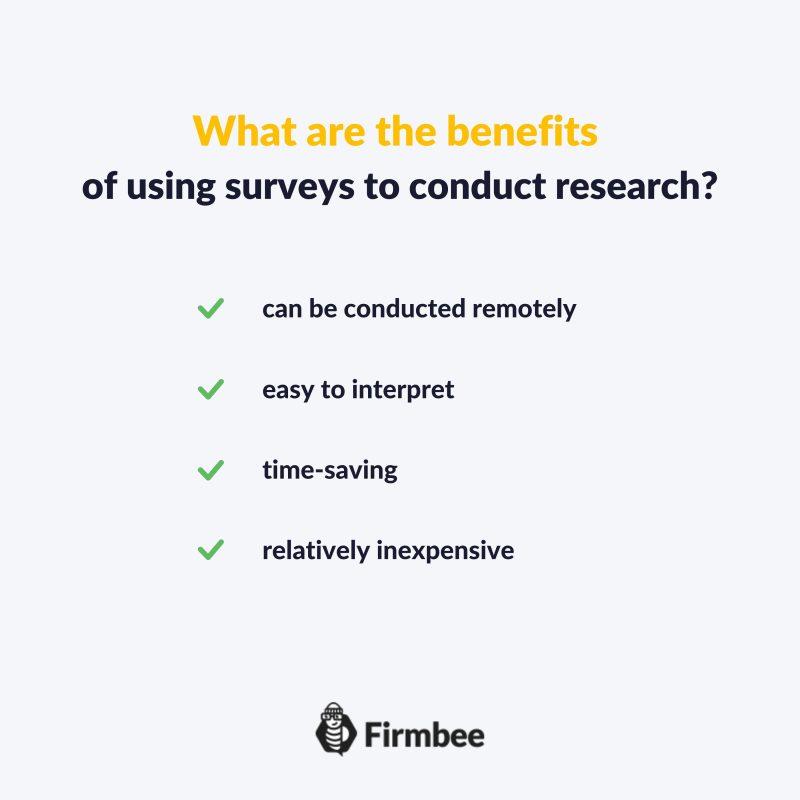Many people think that a startup will succeed when its originator comes up with a brilliant idea. There is something in it. The problem is that not every business concept is good and has market potential. Therefore, it’s worth doing research to validate such a business idea. How to use surveys to do so? Read our article and find out.
How to use surveys for testing your business idea? – table of contents:
- Why do you need to validate your business idea?
- Why to use surveys?
- How to use surveys?
- What is the objective of a survey?
- Who should be interviewed in surveys?
- How to create a survey to vet your business concept?
Why do you need to validate your business idea?
For starters, a quick reminder of why it is important to validate business ideas. This is to save us from wasting time, and most importantly, from losing money. It is obvious that we always have an emotional attitude towards the idea we come up with. This applies to various areas of life, including business.
So you may think that your startup idea is really good, even revolutionary. However, this doesn’t need to be true at all. In fact, a business concept is only good if there are customers for the product or service, and if the idea solves their problem. Otherwise, it’s a pity to waste energy, time, and money on a project doomed to failure.
Why to use surveys?
You always need to vet your business concept. One of the methods of business validation is using surveys. This is a very good solution when you want to get to know your target market. Surveys help to get feedback, but also information about customer needs. Of course, a survey will only work if it is properly prepared, as the purpose of such surveys can vary.
Some questionnaires check the level of brand awareness, others are used to attract new customers, and still, others are to verify a business idea and determine whether there is a potential market for a startup. It’s worth using surveys because they are effective verification tools, and on top of that, they are not expensive at all.
There are two types of survey research methods: a questionnaire (a list of questions that respondents answer individually) and an interview (asking the respondent a series of questions and follow-up questions based on the provided answers).

How to use surveys?
How to use surveys? It may sound weird, but it’s best to start from the end. It is important to consider what you will actually do with the data you will obtain. In this way, you will determine what questions to ask, and what you actually want to find out. The purpose of the survey should address a single issue. If you don’t get a comprehensive view of the situation, you can do another survey, this time concentrating on a different aspect of your business idea.
What is the objective of a survey?
It is necessary to define the clear objectives of the survey. Your goal is to verify whether there is a potential market for your product. This, in turn, requires checking a few important points. You need to find out what type of customers will be interested in your product and why. It is worth verifying how the potential market understands your product and whether customers see it as a real solution to a specific problem.
You need to find out how often the product is likely to be purchased, and how much customers will be willing to pay for it. It’s also worth asking if the audience is familiar with a similar solution and if they use it, what are the advantages of a competing product, and what are its disadvantages.
Who should be interviewed in surveys?
In order for a survey to provide you with valuable and reliable information, you need to know who to interview. This means that you need to determine your target group. It is, therefore, necessary to think about who you are really targeting with your product and learn a little about the chosen group.
It is worth noting the gender of the audience. If your product is universal, your sample should consist of the same number of women and men. When the product is dedicated to a specific gender, bet on its representatives. A good sample size is usually 1000 people.
How to create a survey to vet your business concept?
In order to create a valuable questionnaire to vet your business concept, you need to ask precise questions. After all, it’s important to get reliable answers to make a business decision. When you create a survey, make sure it is clear and clearly worded.
Avoid using jargon unless you know your customers use it, take care to be neutral – don’t ask questions that suggest an answer. Leave space for comments so that your respondents could express their opinions in an uninhibited way.
What do you need to do after conducting a survey? It is, of course, important to make a thorough analysis of the obtained answers and draw meaningful conclusions.
You’ve just learned how to use surveys for testing your business idea. Other resources: Crowdfunding for startups.
If you like our content, join our busy bees community on Facebook, Twitter, LinkedIn, Instagram, YouTube, Pinterest.
Author: Andy Nichols
A problem solver with 5 different degrees and endless reserves of motivation. This makes him a perfect Business Owner & Manager. When searching for employees and partners, openness and curiosity of the world are qualities he values the most.
Launch your startup:
- What is a startup?
- Pros and cons of creating a startup
- 8 best industries for startups
- Top 5 skills every highly successful startup founder needs
- How to create a startup? 7 simple and easy steps
- 6 essential startup development stages
- How to create a startup growth strategy?
- General startup statistics you need to know
- Startup vs. corporate job. Which is right for you?
- 5 incredible companies that started in a garage
- How to find a business idea?
- How to check if your startup idea already exists?
- How to name a startup? Useful tips and strategies
- How to gain business knowledge quickly? 5 best practices
- Why do startups fail? 6 startup ideas you should avoid
- 5 weird business ideas that made millions
- Top 6 most profitable small businesses
- 7 questions to determine if your business idea is worth pursuing
- What is a buyer persona? 5 benefits of creating a buyer persona
- How to validate your business idea? 3 easy steps
- Should you follow your passion? The importance of passion in business
- What is market reseach and why is it important?
- Using social media in business
- What to do when you have too many business ideas?
- How to write a good problem statement for your startup?
- How to test your business idea for real?
- How to create a prototype for a product?
- How to build an MVP?
- How to use surveys for testing your business idea?
- 10 useful tools to validate your business idea
- What is a business plan? 4 types of business plans
- What should be included in a business plan?
- What should a product description include?
- Competitor analysis
- Marketing strategy
- Traditional business plan vs. lean startup plan
- Implementation plan. What is it and how to create it?
- Everything you need to know about patents
- Financial management for startups
- What permits and licenses does my startup need?
- What is the average startup founder salary?
- 4 startup taxes you need to pay
- Which legal structure is best for your business?
- Startup costs. How much money will you need?
- Protection of intellectual property in a startup
- Family funding vs. self-funding
- What is a shareholders’ agreement?
- What should a financial section of a business plan include?



















